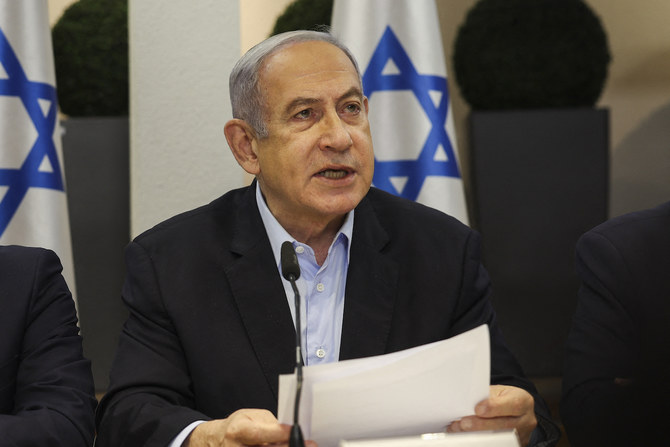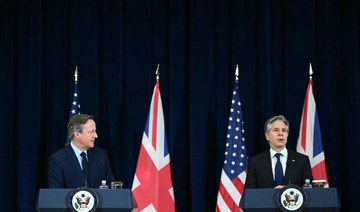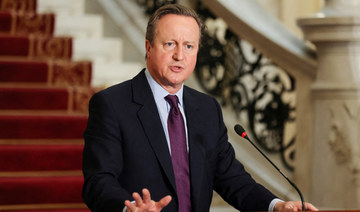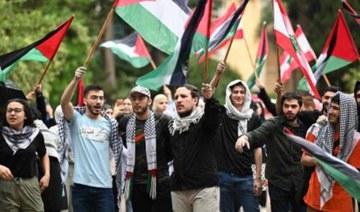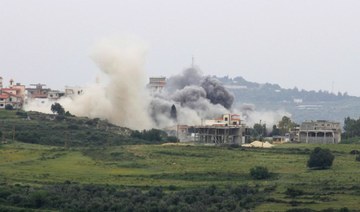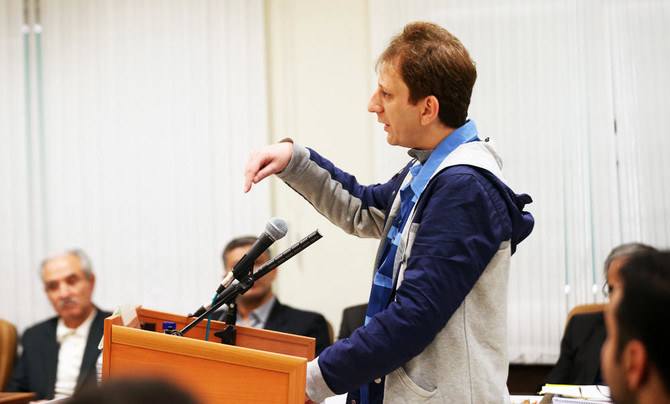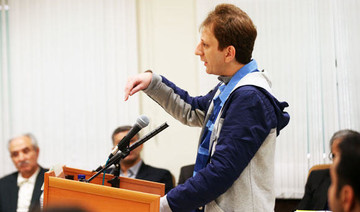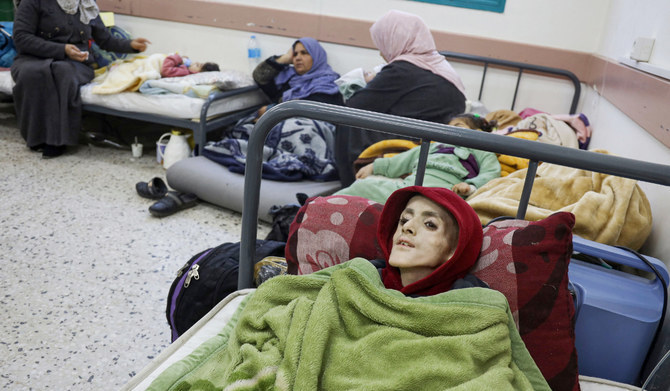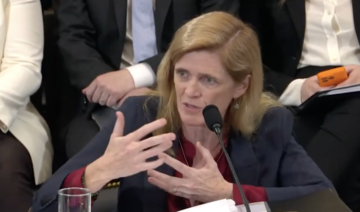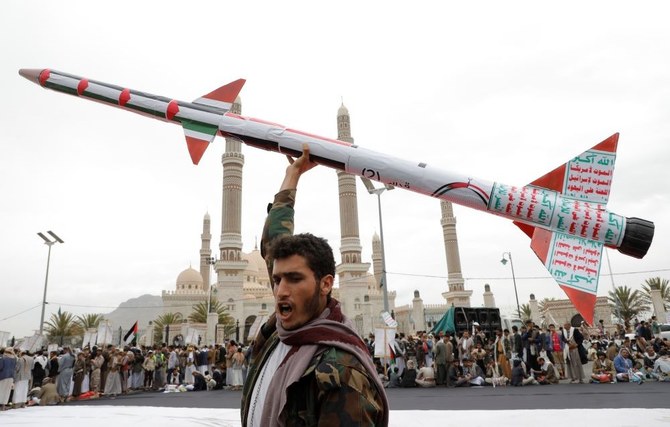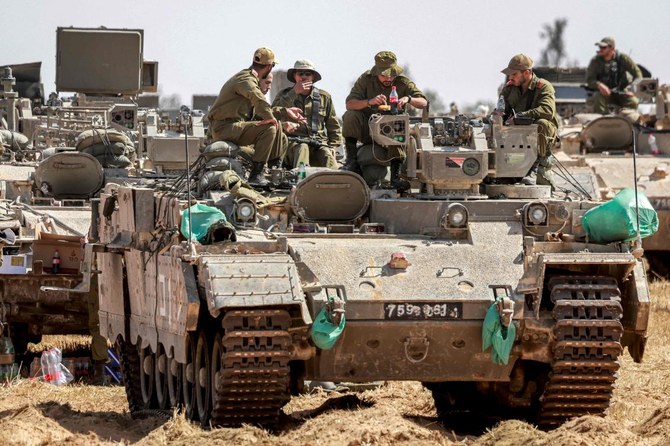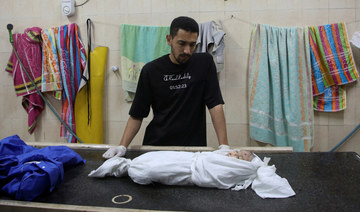JERUSALEM/CAIRO: Israel will make its own decisions about how to defend itself, Prime Minister Benjamin Netanyahu said on Wednesday, as Western countries pleaded for restraint in responding to a volley of attacks from Iran.
The United States, European Union and G7 group of industrialized nations all announced plans to consider tighter sanctions on Iran, seen as aimed at mollifying Israel and persuading it to rein in its retaliation for the first ever direct Iranian strikes after decades of confrontation by proxy.
Netanyahu met the German and British foreign ministers, who both traveled to Israel as part of a coordinated push to keep confrontation between Israel and Iran from escalating into a regional conflict fueled by the Gaza war.
Netanyahu’s office said he thanked David Cameron and Annalena Baerbock for their support, while telling them: “I want to make it clear — we will make our own decisions, and the State of Israel will do everything necessary to defend itself.”
Earlier, Cameron said it was now apparent Israel planned to retaliate for the Iranian missile and drone strikes, which Tehran launched on Saturday in response to a presumed Israeli airstrike that killed military officers at its embassy in Syria.
Baerbock said escalation “would serve no one, not Israel’s security, not the many dozens of hostages still in the hands of Hamas, not the suffering population of Gaza, not the many people in Iran who are themselves suffering under the regime, and not the third countries in the region who simply want to live in peace.” More than six months into the Gaza war between Israel and the Iran-backed Palestinian militant group Hamas that has seen flare-ups across the Middle East, diplomats are searching for a way to avert direct battle between Israel and Iran.
The Iranian missiles and drones launched on Saturday were mostly shot down by Israel and its allies and caused no deaths. But Israel says it must retaliate to preserve the credibility of its deterrents. Iran says it considers the matter closed but will retaliate again if Israel does. Washington says it is planning to impose new sanctions targeting Iran’s missile and drone program in coming days and expects its allies will follow suit. EU leaders are due to discuss sanctions at a summit in Brussels, and sanctions are also on the agenda at G7 talks in Italy.
Since Hamas fighters triggered the war in Gaza by attacking southern Israel, killing 1,200 people and capturing 253 hostages according to Israeli tallies, clashes have erupted between Israel and Iran-aligned groups based in Lebanon, Syria, Yemen and Iraq.
Inside Gaza, Israel has launched a massive air and ground assault, with nearly 34,000 people confirmed killed, according to Palestinian medics, and thousands of others feared dead, still lost among the ruins.
Apart from a single week of ceasefire in November when around half of the hostages were freed, diplomats have so far failed to hammer out terms for a truce.
This month, Israel abruptly pulled most of its troops out of southern Gaza, site of most of the heaviest fighting since the start of the year. Fighting in recent days has been focused in central Gaza, in the Nuseirat camp north of Deir Al-Balah, one of the few areas that Israeli troops have yet to storm.
At a hospital morgue in Deir Al-Balah, members of the Al-Nouri family bellowed in sorrow and anger over bodies in body bags, several the size of small children, in video obtained by Reuters. Authorities said 11 people had been killed in an Israeli strike on the family home on Tuesday.
“Oh people of the world, what is happening is wrong! Have mercy on us! Stop the war! Stop the war! Children are dying in the streets!” a man cried inside the crowded hospital.
Elsewhere, Hamas media reported Israeli forces had withdrawn from Beit Hanoun in northern Gaza after a 36-hour raid there. On Israel’s northern border with Lebanon, where cross-border battles between Israeli forces and the Iran-aligned Hezbollah movement pose an escalation risk, Hezbollah said it had fired on a military target in an Israeli village in retaliation for Israeli strikes that killed Hezbollah members and commanders.
Western countries, including the United States, which initially strongly backed Israel’s campaign against Hamas, have grown increasingly uncomfortable with the high civilian death toll and have called for a ceasefire.
Israel says it will discuss a pause to free hostages but will not stop fighting until Hamas is wiped out; Hamas says it will not release hostages without a truce leading to an end to the war. The prime minister of Qatar, which has served as mediator, said negotiations were at a delicate phase. The Hamas leader, Ismail Haniyeh, three of whose sons were killed in an Israeli strike in Gaza this month, is set to visit Turkiye in coming days for talks with President Tayyip Erdogan.
With the prospect of famine looming, the United States and Israel say access for aid has improved this month. Aid agencies say supplies of food and medicine are still too paltry to stave off humanitarian disaster.



